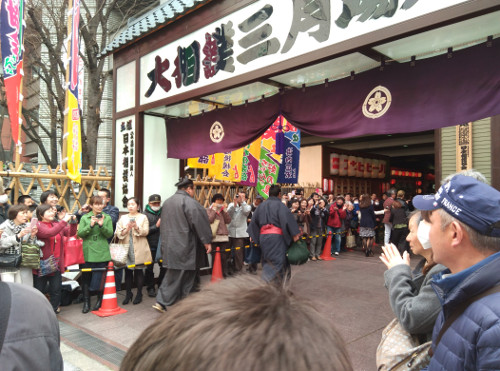Basho and Tell: Sumo Dreams Do Come True
This travel blog comes to us from Andrew Killeen from our sister magazine beijingkids who is detailing is Japanese adventures this week while on spring break with his two school-aged children.
On Sunday, we attended the final day of the Spring Sumo Tournament (basho) in Osaka.
This represented the fulfillment of a decades-long dream for me. Back in my late teens, just as I was discovering the movies of Kurosawa and the crazy world of anime, sumo wrestling was, for a few brief years, regularly shown on British TV. The program was on Channel 4, a station with a reputation for televising obscure minority sports, like kabbadi, wheelchair curling and American football.
But it was sumo which caught my imagination: the arcane ceremonies which reveal the sport's religious origins, the contrast between the wrestlers' huge bulk and their delicate, almost balletic grace, the explosive ferocity and unpredictability of the bouts. So as soon as I knew we were going to Japan, I began checking tournament dates and booking tickets.
I have heard people say that sumo is just fat men pushing each other around. Of course this is true, in the same way that King Lear is just people speaking words, and the Taj Mahal is just a pile of stones. Like any sport, in order to appreciate it, you have to understand it, and get to know the personalities and dramas which give it narrative shape.
So I tried to make sure that the boys had some idea of what was going on; we watched Youtube videos and talked about the rules and history of the sport. Perhaps more importantly, they were given to understand that this was Dad's big day, and if they spoilt it for me, I would be very cross. Or more probably cry.
As we approached the Osaka Prefectural Gymnasium, it was easy to see that we were in the right place. Brightly colored flags fluttered outside, and huge crowds were gathered on the street. We arrived at the same time as limousines bringing many of the senior wrestlers, and despite the fact that people were crowded behind barriers calling out to them and photographing them, we were bemused to find that we just walked in using the same entrance as the stars.

Inside was a combination familiar from sporting events the world over: the tang of testosterone, the overpriced snacks and souvenirs, the crowds of obsessive fans, the bewildered sightseers and glamorous hangers-on. Finding our seats was something of a challenge, as the numbers on our tickets appeared to have no resemblance to the numbering of the seats, but had to be interpreted via a code book like Chico's Tips In A Day At The Races. At last we found a kindly volunteer to translate for us, and guide us to our seats.
This was not the only misleading information on the tickets. After 13 hours of traveling the day before, we had been horrified to see that the event started at 8.30am. A little google fu revealed that the morning bouts are contested by juniors and amateurs, and that nobody really gets there until 2pm, at the earliest. Even after we had arrived, the seats continued to fill up and the atmosphere to grow more intense as the afternoon went on, and one man in front of us only made it in time to watch the last three matches.
My initial worry had been that the boys would get bored and start playing up. We brought books for them to read if they got restless, but the books remained in the bag. There was always something going on: in between bouts there were processions, chanting and of course the ritual stomping and salt-throwing that makes sumo so unique. The matches themselves are usually over in seconds, but they can be won and lost in the preamble, in the stare-outs and the mind games and the build up of adrenaline.
Four hours flew by, and it all came down to a final bout to decide the winner. By now the arena was packed, the crowd vociferous, and the tension palpable. At last the knuckles came down, the challenger charged – and the champion simply stepped aside and helped him out of the ring. It was an oddly anticlimactic end to a thrilling day, and we learned later it was a controversial one. The sidestep, although legal, is frowned upon as unsporting, and poor Hakuho was booed when he gave his post-match interview. He even cried.
I, on the other hand, remained tear-free. The boys stayed in their seats and engrossed in the action, only occasionally having to go outside to practise their own sumo skills. Joseph informs he has abandoned his plans to be a soccer goalkeeper and intends to be a rikishi instead. When I voiced concerns about the idea of him eating such an unhealthy diet, he promised to buy me a house in Japan. On second thoughts, son, have another bowl of rice. Go on, have two.

This article originally appeared on our sister site beijingkids.
Photos: online.wsj.com, Andrew Killeen
Related stories :
Comments
New comments are displayed first.Comments
![]() Fred_Jones
Submitted by Guest on Tue, 03/29/2016 - 15:41 Permalink
Fred_Jones
Submitted by Guest on Tue, 03/29/2016 - 15:41 Permalink
Re: Basho and Tell: Sumo Dreams Do Come True
Wait what does this have to do with Beijing? How much was the flight there? When was the tournament held? How much were tickets?
Cool story bro.
Validate your mobile phone number to post comments.







